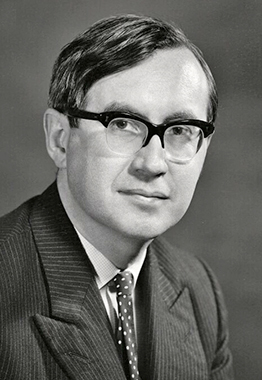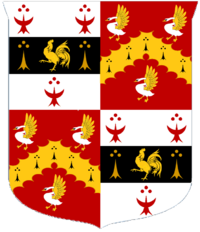William Rees-Mogg facts for kids
Quick facts for kids
The Lord Rees-Mogg
|
|
|---|---|

Rees-Mogg in 1969
|
|
| Chairman of the Arts Council of Great Britain | |
| In office 1982–1989 |
|
| Preceded by | Sir Kenneth Robinson |
| Succeeded by | Peter Palumbo |
| Member of the House of Lords Lord Temporal |
|
| In office 8 August 1988 – 29 December 2012 Life peerage |
|
| Personal details | |
| Born |
William Rees-Mogg
14 July 1928 Bristol, England |
| Died | 29 December 2012 (aged 84) London, England |
| Resting place | Church of St James, Cameley |
| Political party | None (crossbencher) |
| Other political affiliations |
Conservative |
| Spouse | Gillian Morris |
| Children | 5 (including Sir Jacob and Annunziata) |
| Education |
|
| Alma mater | Balliol College, Oxford |
| Profession | Newspaper journalism |
| Awards | Knight Bachelor (1981) |
William Rees-Mogg (born 1928, died 2012) was an important British journalist and public figure. He was best known for being the editor of the famous newspaper The Times. He also held important roles in British culture and government, like leading the Arts Council of Great Britain and being part of the House of Lords. His children, Sir Jacob and Annunziata Rees-Mogg, also became well-known politicians.
Contents
Early Life and Education
William Rees-Mogg was born in 1928 in Bristol, England. His father was Edmund Fletcher Rees-Mogg, and his mother was Beatrice Warren. William was raised in the Roman Catholic faith.
He went to Clifton College Preparatory School and then Charterhouse School. At Charterhouse, he was the Head of School, which is a big leadership role.
In 1946, before he was 18, he started studying history at Balliol College, Oxford. He was a very bright student and quickly became involved in student politics.
However, he paused his studies to do his National Service from 1946 to 1948. He served in the Royal Air Force, where he helped teach recruits to read and write. After his service, he returned to Oxford to finish his degree. He became the President of the Oxford University Conservative Association and later the President of the Oxford Union, a famous debating society. He graduated in 1951.
A Career in Journalism
William Rees-Mogg started his journalism career in London in 1952 at the Financial Times. He quickly moved up, becoming a chief writer and assistant editor.
He also tried to become a MP for the Conservative Party in the 1950s, but he was not elected.
In 1960, he moved to The Sunday Times, where he became the Deputy Editor. He wrote an important article that many believe helped Alec Douglas-Home decide to step down as the leader of the Conservative Party.
Leading The Times Newspaper
Rees-Mogg became the editor of The Times newspaper in 1967. He held this important position until 1981. During his time, he tried to buy the newspaper group to prevent it from being sold to Rupert Murdoch. However, his attempt was not successful.
After leaving The Times, he wrote a column for The Independent newspaper from 1986 to 1992. He then returned to The Times as a columnist, writing for them until shortly before he passed away. He later said that Rupert Murdoch had been a good owner for The Times.
Public Service and Recognition
Beyond journalism, William Rees-Mogg was involved in many public roles. He was a member of the Board of Governors of the BBC, which helps run the British Broadcasting Corporation.
He also served as the chairman of the Arts Council of Great Britain. This organization supports arts and culture in the UK. He made big changes there, reducing the number of arts groups that received regular funding.
In 1978, he was the High Sheriff of Somerset, a ceremonial role in his home county. For his public service, he was made a Knight Bachelor in 1981 by Elizabeth II at Buckingham Palace. This meant he could be called "Sir William Rees-Mogg."
In 1988, he was made a life peer, becoming Baron Rees-Mogg. This allowed him to sit in the House of Lords, which is part of the UK Parliament. He sat as a cross-bencher, meaning he did not belong to a specific political party. The University of Bath also gave him an honorary degree in 1977.
Books and Ideas
Rees-Mogg wrote several books, often with James Dale Davidson. These books focused on financial investment and the future of how countries and money would work.
One of his most famous books was The Sovereign Individual, published in 1997. This book suggested that in the age of the internet, countries might become less important. Instead, individuals would have more power and freedom. This book has influenced many thinkers, including Peter Thiel, a co-founder of PayPal.
He also chaired a publishing company called Pickering & Chatto Publishers and wrote a weekly column for The Mail on Sunday. He enjoyed collecting books from the 18th century.
Family Life
William Rees-Mogg married Gillian Shakespeare Morris in 1962. Her father, Thomas Richard Morris, was a lorry driver who became a local politician and a JP.
William and Gillian had five children:
- Emma Beatrice Rees-Mogg (born 1962): She is a novelist who writes under the name Emma Craigie.
- Charlotte Louise Rees-Mogg (born 1964)
- Thomas Fletcher Rees-Mogg (born 1966)
- Jacob William Rees-Mogg (born 1969): He became a well-known Conservative politician and a Member of Parliament. He has held important government roles, including Leader of the House of Commons.
- Annunziata Mary Rees-Mogg (born 1979): She also became a politician and was elected as a Member of the European Parliament for the Brexit Party.
The family was Roman Catholic. William Rees-Mogg once spoke about the need for the Vatican to improve its public relations.
In 1964, Rees-Mogg bought Ston Easton Park, a historic house near Bath, Somerset. He worked to restore the house before selling it in 1978.
Later Years and Passing
William Rees-Mogg became ill with oesophageal cancer in late 2012. He passed away in London on December 29, 2012, at the age of 84. His funeral was held at Westminster Cathedral, and he was buried in the graveyard of the Church of St James, Cameley in Somerset.
|
Books by William Rees-Mogg
- The reigning error: The crisis of world inflation (1975)
- Blood in the Streets: Investment Profits in a World Gone Mad (1987, with James Dale Davidson)
- Picnics on Vesuvius: Steps towards the millennium (1992)
- The Great Reckoning: How the World Will Change Before the Year 2000 (1992, with James Dale Davidson)
- The Sovereign Individual: Mastering the Transition to the Information Age (1997, with James Dale Davidson)
See Also
 | Stephanie Wilson |
 | Charles Bolden |
 | Ronald McNair |
 | Frederick D. Gregory |



